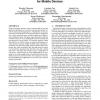Free Online Productivity Tools
i2Speak
i2Symbol
i2OCR
iTex2Img
iWeb2Print
iWeb2Shot
i2Type
iPdf2Split
iPdf2Merge
i2Bopomofo
i2Arabic
i2Style
i2Image
i2PDF
iLatex2Rtf
Sci2ools
SIGCOMM
2009
ACM
2009
ACM
Virtual individual servers as privacy-preserving proxies for mobile devices
People increasingly generate content on their mobile devices and upload it to third-party services such as Facebook and Google Latitude for sharing and backup purposes. Although these services are convenient and useful, their use has important privacy implications due to their centralized nature and their acquisitions of rights to user-contributed content. This paper argues that people’s interests would be be better served by uploading their data to a machine that they themselves own and control. We term these machines Virtual Individual Servers (VISs) because our preferred instantiation is a virtual machine running in a highly-available utility computing infrastructure. By using VISs, people can better protect their privacy because they retain ownership of their data and remain in control over the software and policies that determine what data is shared with whom. This paper also describes a range of applications of VIS proxies. It then presents our initial implementation and evalu...
| Added | 28 May 2010 |
| Updated | 28 May 2010 |
| Type | Conference |
| Year | 2009 |
| Where | SIGCOMM |
| Authors | Ramón Cáceres, Landon P. Cox, Harold Lim, Amre Shakimov, Alexander Varshavsky |
Comments (0)

